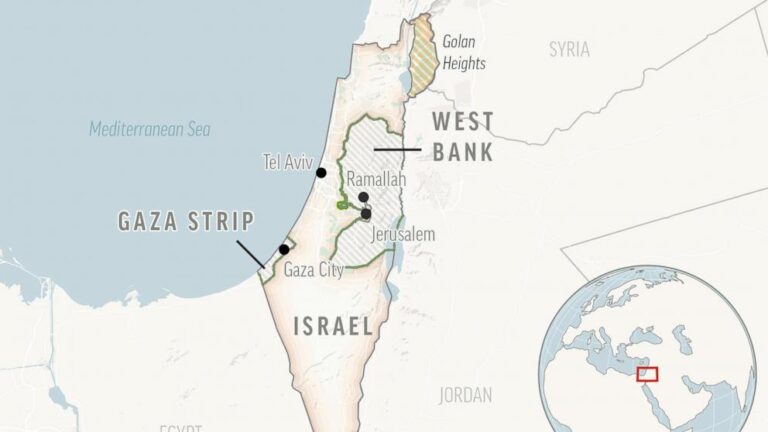RAMALLAH, West Bank — Palestinian factions Hamas and Fatah have signed a declaration in Beijing ending a long-standing rift, Chinese state media reported Tuesday, a step that could ease deep divisions between the two sides as the war in Gaza rages.
The declaration by the two largest Palestinian political factions and other smaller Palestinian groups to form a unity government for the Palestinian territories is the latest in a series of talks aimed at bringing the two sides together.
But previous declarations have failed, including a similar agreement in 2011, raising doubts whether the China-backed talks will actually lead to a solution. Israel and Hamas are also in the midst of considering an internationally backed ceasefire proposal that would end the nine-month war and free dozens of Israeli hostages being held by Hamas.
Still, Gaza’s future remains undecided, with Israel strongly opposing any role for Hamas in governing the swath of the country. It has also rejected U.S. requests to hand over Gaza to a Fatah-dominated Palestinian Authority once the war ends. The lack of a vision for how the Strip should be governed after the war has complicated ceasefire negotiations.
Nearly 10 months after the current war erupted in Gaza, Hamas officials say the party has no intention of returning to governing Gaza as it did before the conflict, and instead calls for the formation of a technocratic government agreed upon by various Palestinian factions to pave the way for elections in Gaza and the West Bank with the intention of forming a unity government.
The two groups signed the Beijing Declaration, which they said would “end divisions and strengthen Palestinian unity,” state broadcaster CCTV said.
Israeli Foreign Minister Israel Katz summarily rejected the agreement on Tuesday, saying there would be no joint Hamas-Fatah rule in Gaza because “Hamas’s rule will be shattered.”
The two rival Palestinian groups, along with 12 other political factions, met with Chinese Foreign Minister Wang Yi, wrapping up talks that began on Sunday, according to a post by Chinese television station CGTN on the social media platform Weibo.
The agreement also underscores China’s expanding role in Middle East diplomacy, fuelled by the successful repair of ties between Saudi Arabia and Iran.
“But certainly China is still trying to gain credibility as a global mediator,” said James Char, a research fellow at the Institute of Defence and Strategic Studies at Nanyang Technological University in Singapore.
A joint statement issued after the recent talks in Beijing gave no details on how or when a government would be formed, saying only that it would be established “through mutual agreement between the factions.” It said the two groups are committed to establishing a Palestinian state on land seized by Israel in the 1967 Middle East war.
The agreement does not appear to bridge the two groups’ differing positions on Israel: Hamas has previously said it would accept a state based on the 1967 borders but refuses to officially recognise Israel, while the Fatah-dominated Palestinian Authority remains abiding by interim peace deals it signed with Israel in the early 1990s.
The agreement signed by the Palestinian parties committed to following up on previous reconciliation agreements signed in 2011 and 2022.
“China’s understanding is based on broadening the scope of membership of the Palestine Liberation Organization (PLO) to include other non-member factions, including Hamas,” Fatah spokesman Jamal Nazar said.
“There is still a long way to go and most of it will be implemented after the ceasefire is in place,” he added.
Fatah and Hamas have been rivals since 2007, when Hamas violently defeated forces loyal to Palestinian President Mahmoud Abbas in the Gaza Strip, seizing control of the impoverished coastal enclave. Abbas’s Fatah-led Palestinian Authority governs parts of the occupied West Bank. It is widely viewed by Palestinians as corrupt, naive and an Israeli subcontractor in terms of joint security coordination.
Hamas members have never been affiliated with the PLO, the Palestinian authority responsible for international affairs. In a statement, Husam Badran, a Qatar-based Hamas political leader, praised the agreement, calling it “another positive step towards achieving Palestinian national unity.”
But Tuesday’s agreement has no hard deadline.
“There is an opportunity, but it’s not a big one because there is no specific timetable for implementation,” said Hani al-Masri, an expert on Palestinian reconciliation issues.
Repeated attempts to mend the rift have failed due to fierce rivalries between the factions over power and the West’s unwillingness to accept any government, including Hamas, without explicitly recognising Israel.
U.S. President Joe Biden’s administration envisions a revamped Palestinian Authority to govern the post-war Gaza Strip and is exploring a series of reforms to ensure self-governance can survive in the war-torn territory. Israel has rejected the idea but has not offered a credible alternative for who should govern the Gaza Strip.
Palestinian Islamic Jihad, a small militant group allied with Hamas, issued a statement on Tuesday after the meeting saying it “rejects any form of explicit or implicit recognition of Israel” and “demanded the withdrawal of the Palestine Liberation Organization’s recognition of Israel.”
___
Goldenberg reported from Tel Aviv, Israel, and Wu from Bangkok. Abby Sewell contributed to this report from Beirut.

